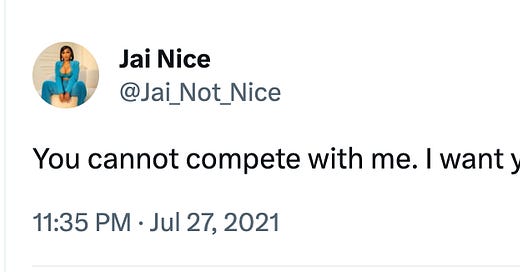Hello, friends. Last issue’s format struck a chord, so I’m going to keep it going and share more things I’ve been thinking about.
Some things I think:
The thing about smart people is that they tend to think that if they think really hard about something, they might figure it out, when the truth is, in strategy (and life in general), there is never one right answer. Strategy requires making choices about a future that is not yet known. I’m one of those people that tends to over-intellectualize things and often just end up tying myself into twisted knots. For example, I believe speed is important. But I also believe that months of continuous pondering can produce an insight that lights the way for months to come. I understand the argument for shipping early and often. But I also believe that we should aspire to build lovable products, not viable products. And lovable products take time to build and polish.
There are no easy answers. Do you know what I mean?
Part of the problem with the Lean Startup mindset is that it sees life and work as an optimization problem. The point is to help people live a good life, not just an efficient life. The goal is human flourishing, not convenience. The goal is a good future, not just a technically advanced future.
I’ve lost a lot of faith in tech solutionism - the idea that most problems can be solved by technology. Why? Because most problems are people problems, not technology problems. I don’t believe we are about to surrender to a robotic new dawn, where an AI will replace McKinsey or your therapist. Why? Because a company doesn’t hire McKinsey because they are better than the AI. They hire McKinsey because if something goes wrong, nobody will blame you for hiring McKinsey. Humans are complicated.
I believe “what effect do you want to have on people” is one of the most important questions we should ask when we are making something. Life isn't just a series of problems to be solved but experiences to be had.
With three young kids, my relationship with time is complicated. I am at the stage where my alarm clock is a tiny pair of lungs and the idea of a vacation is a 15-minute drive to Whole Foods. These words by Charles Bukowski stopped me in my tracks, I think because my honest answer right now is freedom, but one day, when the kids are grown up, I know it will be loneliness:
and when nobody wakes you up in the morning, and when nobody waits for you at night, and when you can do whatever you want. what do you call it, freedom or loneliness?
Twitter is packed with thinkbois writing threads about how to 100x your productivity with AI tools I bet they’ve never used. Here’s what the thinkbois won’t tell you: better tools are not the bottleneck to creating great work. A person focusing on one thing the antiquated way - pen and paper or whatever - will beat the tool optimizers any day. A new piece of technology isn’t going to magically hone your craft. The work to hone your craft feels hard because it’s supposed to be hard.
When I hear people say things like “our goal is to be at 5mm ARR by 2024” I always get a little sad and uncomfortable. I don’t have quantifiable goals like that. And if I do, any number I choose feels arbitrary. My goals are usually more qualitative - to create simple, delightful products that are meaningful for the people they serve, to create digital surfaces that feel human, nourishing, inspiring. In the famous Amazon 1997 letter to shareholders, Bezos lays out the Amazon philosophy with a simple refrain: “a relentless focus on customers.” This is not a goal to be strived for, but a way of operating. And maybe that’s okay: committing to a way of operating versus setting arbitrary return targets or sales goals, and trusting that the numbers are just a by-product of committing to a process.
Simplicity is difficult because most of us are overcompensating for uncertainty. Adding something is easy. But removing something is hard, because it requires conviction. It’s easier to hedge against uncertainty, entertain multiple paths, and dilute your focus than to develop a strong opinion about what to exclude.
I generally love working behind a screen, but it does make me a little sad that I don’t get to experience the satisfaction of giving a physical thing to another person. It must be nice to give someone a finished product, a physical thing, and experience the tangible benefit of your creations. In software, we just don’t get the same satisfaction. We are constantly dealing with bits and bytes and coded abstractions, in the hope that, eventually, we’ll make someone feel something in the physical world. But we just don’t know.
We don't have enough experience with early versions of ambitious projects to know how to respond to them. We judge them based on where they are currently, not based on what they could become. The same is true for how we judge people. Someone should create a Substack newsletter called Early Days where they use Internet Archive’s Wayback Machine to track how a product has evolved over time.


